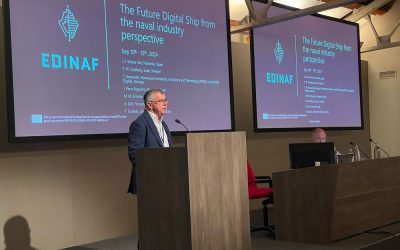The Naval Architect: April 2020
“We’ve heard the word disruption over the last few years in the context of new technology companies and how they’ve disrupted traditional businesses, but Covid-19 has just slapped everybody in the face,” says Paul Cuatrecasas, a former investment banker turned tech entrepreneur, whose company Aquaa Partners helps older businesses join forces with tech startups.
Cuatrecasas highlights a recent report by Prologis which predicts e-commerce will rise hugely as a result of the pandemic and that shippers will look for an ‘originalised’ approach and a more resilient supply chain.
“The two tools the report suggests will emerge to support this are robotics and 3D printing, the same things we’ve been talking about to our clients for the last few years,” he says. “These tools will increase factory productivity and allow for locations that are adjacent to the end user, instead of shipping goods halfway across the world.”
Danish giant Maersk, Cuatrecasas suggests, is the perfect example of an ageing company, laden with fixed assets and low gross margins, that has very little strategic flexibility. Over the last five years the value of Maersk shares have dropped by around 67%. By contrast, investors place a higher valuation on emerging freight tech companies, providing services such as end-to-end supply chain management and tracking.
Cuatrecasas also expects autonomous transportation to come to the fore, but while autonomous vessels and road vehicles may have a role to play, the real transformation could come from the development of flying cargo drones. “When you combine drones with 3D printing, robotics and AI software you have a completely different ecosystem of transportation, one that’s extremely resilient to any kind of shock.”
Parcel drone services, such as Amazon’s much-publicised air deliveries, could have a trickle-down effect and accelerate technological know-how, spearheading a projecting rise in e-commerce from 14% today to around 60% by 2030.
But the bigger implications for maritime, in particular container shipping, could be larger cargo drones, where companies such as China’s Sichuan Tengden Technology are developing eight-engine drones capable of carrying a maximum cargo of 20tonnes up to 7,500km.
“When you start to look at that in the context of ships you start to question whether you really need them anymore. Of course they’re not going away completely but we’re talking about the rapid evolution of new technology and not having to involve humans in the supply chain.”
While, given the economy of scale, this may have fewer implications for dry cargo ships and tankers, Cuatrecasas believes that the changing use of materials will also have a significant bearing on the quantities and types of materials needed.
“In the future a lot of goods will be 3D printed and assembled locally. If there’s a 10 or 20% reduction over time, because more things can be transported by cargo drone, what will that mean for the shipping business? As Maersk illustrates they are already under pressure from a cashflow and profit perspective. And if these companies can’t survive who’s going to be doing the shipping?”
Cuatrecasas thinks that one of the most effective ways for maritime companies to adjust to this new era is to find the right technology partners and be willing to learn from them. “Maersk has been very active in partnerships and has a venture capital (VC) fund, but if you’re an established player the key is to do it in a very considered way.
“The challenge established companies have in trying to do things in-house is they really don’t know how to do things that differently from what they’ve done before. Unless there’s an external catalyst a large organisation can’t change in the way that it needs to.”





